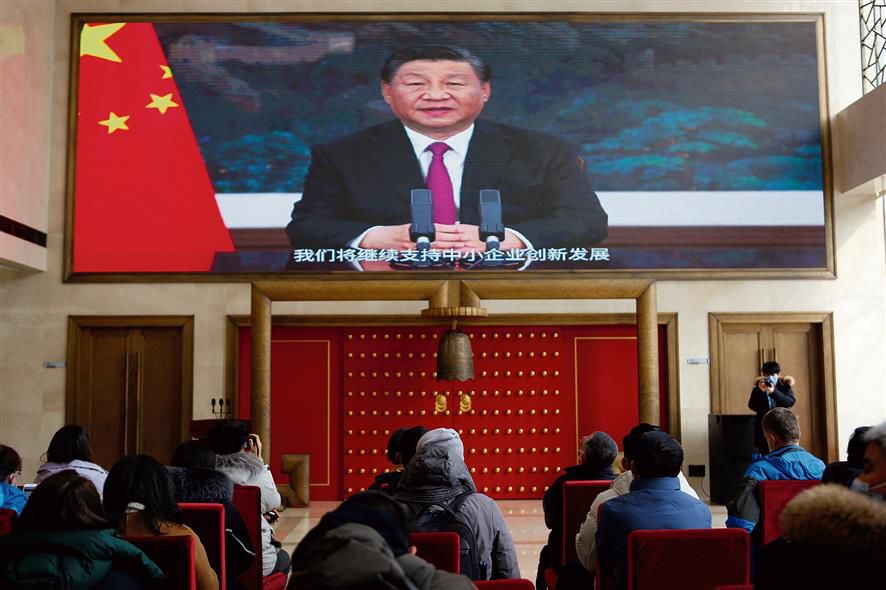
Strategy: At the policy level, China desires self-sufficiency in critical technologies and food products while making other countries more reliant on it. Reuters
Yogesh Gupta
Former Ambassador
IN an interview to Bloomberg Television on March 5, Sharmin Mossavar-Rahmani, chief investment officer of the Private Wealth Management Company at Goldman Sachs, advised investors not to invest in China’s stock market despite the CSI 300 index hitting a five-year low in February. There were many uncertainties in China’s policy direction, the recent security measures had worsened the global sentiment, and there were worries over its declining domestic demand and escalating geopolitical tensions, she explained. Though the stock market had improved after the regulators took steps to reduce selling and increase institutional purchases, there were doubts whether the measures would lift the economy. China claimed that its economy grew by 5.2 per cent in 2023, but many economists and China experts doubt this figure, given the ailing property sector, declining foreign investment, trade and low consumption expenditure.
The gloomy economic scene in China is borne out by facts and figures. China’s net FDI plummeted to $33 billion in 2023, about one-tenth of $344 billion in 2021, as per China’s State Administration of Foreign Exchange. The American chip-related global investments in China plunged from 48 per cent in 2018 to 1 per cent in 2022, shifting to India, Singapore and Malaysia. A US company, Teradyne, which manufactures testing equipment for chip fabrication, and British company Graphcore, which makes chips for artificial intelligence, recently shifted out of China. Japanese automakers such as Mitsubishi Motors, Toyota and Honda have either closed or reduced their presence in China, even as Chinese companies have become more competitive.
The situation worsened after China’s crackdown on foreign companies, including the arrest of business executives on the charges of commercial espionage, since May 2023.
The competitive manufacturing, efficient supply chains, streamlined logistics and increasing exports supported by the government have been the hallmarks of the Chinese economy. China has been responsible for 31 per cent of the global manufacturing (value-added). After years of rising trade with advanced economies, China’s exports to the US and EU countries, which account for about 40 per cent of its total exports, declined by more than 10 per cent in 2023 due to the high tariffs imposed by the US, efforts to diversify purchases of certain items and declining economic growth in the EU. Last year, China’s total exports declined for the first time after 2016 (compared to 2022) by 4.6 per cent to $3.38 trillion. The saviour was China’s exports to Russia, which surged by 46.9 per cent; otherwise, the decline would have been sharper. China is trying to find new markets in the developing countries of Asia, Africa and Latin America.
Besides trade and investment, expatriates from the West and other regions stationed in China are also decreasing. China gave 7,11,000 residence permits to foreigners in 2023, down by 15 per cent from 2019, as per its National Immigration Administration. The US State Department has kept China on its ‘reconsider travel’ list since March 2023, citing the risk of “detention and arbitrary enforcement of local laws”. The number of passport renewals, as per the US Embassy in Beijing, has sharply reduced from the pre-pandemic level. The number of British nationals in China has declined by about 50 per cent from 2019 to about 16,000, as per the British Chamber of Commerce in China. The number of the Japanese has reduced by about 13 per cent and South Koreans by around 30 per cent from 2019, as per official figures.
Similarly, foreign tourist arrivals in 2023 were down by about 60 per cent from the pre-Covid level. As per a Chinese analyst, major airports in the country are ‘eerily empty’, with international flights bringing few foreigners due to China’s increasing quarrels with the US and other countries, reports of arbitrary arrests and detention, its obsession with security and China’s support for Russia in the Ukraine war.
Foreign students in China returned to their home countries after the outbreak of Covid-19 in 2020. Most of them are yet to return, deterred by the geopolitical tensions, reports of a decline in the Chinese economy, high unemployment, low prospects of getting a decent job and China’s new counter-espionage law, which has made it difficult to do research work. Many keen on learning Chinese are instead going to Taiwan. The number of American students in China declined from about 15,000 in the 2011-12 academic year to about 350 in 2022, as per the US Embassy in Beijing. According to the Chinese Ministry of Higher Education, the number of foreign students freshly enrolled in higher education institutions dropped from 1,72,571 in 2019 to 1,14,112 in 2022.
As remedial action, China has pledged to improve the participation of private companies in major national projects, to allow them to borrow more, expand consumption of consumer goods and promote high-technology industries such as those involved in electric vehicles, batteries and solar energy projects. China has scrapped tourist visa requirements for 15 countries, including France and Germany, broken down market barriers for multinationals and eased restrictions on cross-border data flows. At the policy level, China desires self-sufficiency in critical technologies and food products, while making other countries more reliant on it. It wants to create new markets dependent on China, control supply chains and secure access to key resources for its industry, energy and food needs.
Not long ago, there was a lot of global interest in visiting, understanding and doing business with China. That has waned now as many countries, such as the US, UK, EU nations, Japan, India and the Philippines, consider China as a threat to the current world order as well as their security and are taking steps to reduce their dependence on her, establishing supply chains in their own or in friendly countries. While the complete exclusion of China from global supply chains is not possible, given its vast involvement and ability to manufacture many items at lower prices, the diversification of supply chains is underway for many items, though at a slow pace.
Join Whatsapp Channel of The Tribune for latest updates.




























